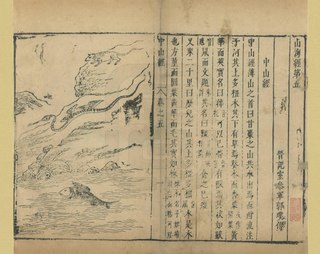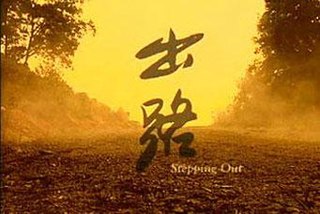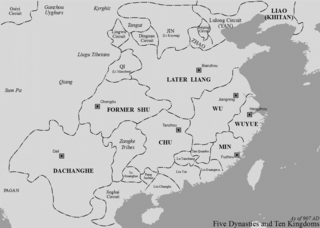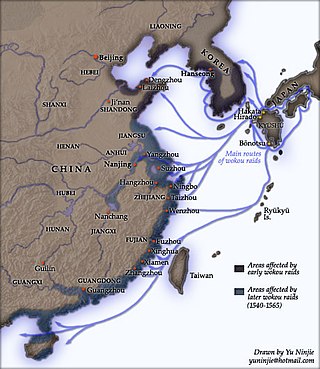Related Research Articles
The history of the Chinese literature, some scholars prefer the term "Sinophone literature", extends thousands of years, from the earliest recorded dynastic court archives to the mature vernacular fiction novels that arose during the Ming dynasty to entertain the masses of literate Chinese. The introduction of widespread woodblock printing during the Tang dynasty (618–907) and the invention of movable type printing by Bi Sheng (990–1051) during the Song dynasty (960–1279) rapidly spread written knowledge throughout China. In more modern times, the author Lu Xun (1881–1936) is considered an influential voice of baihua literature in China.

Tian Han, formerly romanized as T'ien Han, was a Chinese drama activist, playwright, a leader of revolutionary music and films, as well as a translator and poet. He emerged at the time of the New Culture Movement of the early 20th century and continued to be active until the Cultural Revolution, when he was denounced and jailed for two years until his death, before being "posthumously rehabilitated" by the Chinese authorities in 1979. He is considered by drama historians as one of the three founders of Chinese spoken drama, together with Ouyang Yuqian and Hong Shen. His most famous legacy may be the lyrics he wrote for "March of the Volunteers" in 1934, which were later adopted as the national anthem of the People's Republic of China.

The Classic of Mountains and Seas, also known as Shanhai jing, formerly romanized as the Shan-hai Ching, is a Chinese classic text and a compilation of mythic geography and beasts. Early versions of the text may have existed since the 4th century BCE, but the present form was not reached until the early Han dynasty. It is largely a fabulous geographical and cultural account of pre-Qin China as well as a collection of Chinese mythology. The book is divided into eighteen sections; it describes over 550 mountains and 300 channels.

The Yan Emperor or the Flame Emperor was a legendary ancient Chinese ruler in pre-dynastic times. Modern scholarship has identified the Sheep's Head Mountains just north of Baoji in Shaanxi Province as his homeland and territory.

Stepping Out is a 1999 Singaporean Mandarin drama series adapted from a historical book, which reran several times like in 2006, 2019 and in 2021. It stars Yvonne Lim, Terence Cao, Cynthia Koh, Xie Shaoguang, Ivy Lee and Tay Ping Hui as the casts of the series.

Hai Rui, courtesy name Ruxian (汝贤), art name Gangfeng (刚峰), was a Chinese scholar-official of the Ming dynasty, remembered as a model of honesty and integrity in office. A play based on his career, Hai Rui Dismissed from Office by Wu Han, gained political significance in the 1960s during the inception of the Cultural Revolution.

Zhou Xinfang, also known by his stage name Qilin Tong was a Chinese actor and musician who was a Peking opera actor who specialized in its "old male" roles. He is considered one of the greatest grand masters of Peking Opera of the 20th century and the best known and leading member of the Shanghai school of Peking opera. He was the first director of the Shanghai Peking Opera Company.
Kapitan China Koh Lay Huan was a wealthy and educated man, who had earlier rebelled against the Manchu-led Chinese Qing dynasty and fled to Siam and the Malay States, to eventually settle in Penang as its first Kapitan China. He was a merchant, planter, tax farmer, Chinese secret society headman, and one of a handful of pioneering leaders of Penang.

Hi My Sweetheart is a 2009 Taiwanese drama starring Show Lo, Rainie Yang and Lee Wei. It was produced by Comic Ritz International Production (可米瑞智國際藝能有限公司) and Chai Zhi Ping as producer and directed by Lin He Long. It started filming on 26 July 2009 and wrapped on 23 November 2009. It was filmed in Kaohsiung, Taiwan and Hangzhou, China.

Kiều Công Tiễn was a general in the court of Dương Đình Nghệ, a Vietnamese Jiedushi of Tĩnh Hải quân who took over the position in 931. In 937 Kiều Công Tiễn assassinated the Jiedushi to seize his position and thus provoked a revolt led by Ngô Quyền who sought revenge his lord and father-in-law Dương Đình Nghệ. In response to the attack, Kiều Công Tiễn appealed to Liu Yan, the emperor of Southern Han, for reinforcements but he was defeated and executed by Ngô Quyền before the army of Southern Han entered the country. Ngô Quyền subsequently won a decisive victory over the Southern Han in the Battle of Bạch Đằng River and would go on to inaugurate the continuous independence of Vietnam for the first time in nearly a thousand years.

Relic of an Emissary is a 2011 Hong Kong historical fiction television drama serial produced by TVB.
Shahid Mahmood Nadeem is a Pakistani journalist, playwright, screenwriter, theater and television director, and a human rights activist.

A Sentimental Story is a 1997 Chinese romantic thriller television drama series directed by Zhao Baogang and written by Hai Yan. The story is about a young policewoman falling in love with a gangster she pursues. A smash hit, the series is credited with catapulting lead actress Xu Jinglei, a little-known Beijing Film Academy student, to national fame.

Tĩnh Hải quân or Jinghai Circuit, also known as Annam (安南), was an administrative division of the Tang dynasty of China administered by Chinese governors, which then later became a quasi-independent regime ruled by successive local Vietnamese warlords and monarchs. It was centered around what is now northern Vietnam from 866 to 967 during the late Tang period and lasted until the late Five Dynasties and Ten Kingdoms period when Đinh Bộ Lĩnh established the Đinh dynasty.

The Jiajing wokou raids caused extensive damage to the coast of China in the 16th century, during the reign of the Jiajing Emperor in the Ming dynasty. The term "wokou" originally referred to Japanese pirates who crossed the sea and raided Korea and China; however, by the mid-Ming, the wokou consisted of multinational crewmen that included the Japanese and the Portuguese, but a great majority of them were Chinese instead. Mid-Ming wokou activity began to pose a serious problem in the 1540s, reached its peak in 1555, and subsided by 1567, with the extent of the destruction spreading across the coastal regions of Jiangnan, Zhejiang, Fujian, and Guangdong.

Hu Zongxian, courtesy name Ruzhen (汝貞) and art name Meilin (梅林), was a Chinese general and politician of the Ming dynasty who presided over the government's response to the wokou pirate raids during the reign of the Jiajing Emperor. As supreme commander, he was able to defeat Xu Hai's (徐海) substantial raid in 1556 and capture the pirate lord Wang Zhi the next year through ruses. Despite his accomplishments, Hu Zongxian's reputation had been tarnished by his association with the clique of Yan Song and Zhao Wenhua, traditionally reviled figures in Ming historiography. He was rehabilitated decades after his death and was given the posthumous name Xiangmao (襄懋) by the emperor in 1595.

Nirvana in Fire is a 2015 Chinese historical drama and thriller based on Hai Yan's book Lang Ya Bang (瑯琊榜). It was directed by Kong Sheng and Li Xue, and stars Hu Ge, Liu Tao and Wang Kai as Mei Changsu, Princess Nihuang and Prince Jing. The series tells the story of Lin Shu, who, under the alias Mei Changsu, enters the capital of Liang to seek justice for a conspiracy that labeled his family as traitors 12 years before. It originally aired two episodes daily on Beijing TV and Dragon TV, Monday through Sunday from 19:30 to 21:00, from September 19 to October 15, 2015.

Sinful Debt is a 1995 Chinese television drama directed by Huang Shuqin and produced by Shanghai Television. It was written by Ye Xin, based on his 1992 novel Educated Youth. The series follows five innocent-eyed teens who travel more than 2000 km from remote Xishuangbanna Dai Autonomous Prefecture to Shanghai searching for their unacquainted parents — former sent-down youths who in order to return home abandoned them in the countryside. They teens did not expect, however, that their unannounced arrivals would create myriads of economic and relational problems for their urban parents, many of whom already remarried with new families.

"The Bookworm" is a short story by Pu Songling first published in Strange Stories from a Chinese Studio (1740). The story revolves around an innocent scholar Lang Yuzhu and his romantic encounter with a celestial being hidden in his books. An English translation of the story by Sidney L. Sondergard was released in 2014.

Xu Jie courtesy name Zisheng (子昇), was a Chinese politician of the Ming dynasty.
References
- ↑ Zhu, Ying; Keane, Michael; Bai, Ruoyun, eds. (2008). "Introduction". TV Drama in China. Hong Kong University Press. p. 8. ISBN 9789622099418.
- ↑ Zhong Xueping (2010). Mainstream Culture Refocused: Television Drama, Society, and the Production of Meaning in Reform-Era China. University of Hawaii Press. p. 102. ISBN 978-0-8248-3469-2.